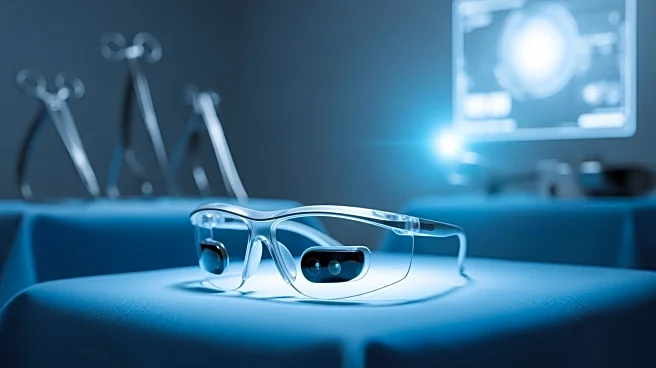What's Happening?
Lumus, a developer of augmented reality (AR) eyewear technology, has partnered with Snke to introduce SnkeXR AR glasses designed for clinical and surgical environments. These glasses are the first open-platform,
medical-grade AR glasses engineered to integrate directly into existing healthcare devices and workflows. They support high-precision clinical applications such as obstetric imaging, surgical planning, dental implants, interventional cardiology, and remote assistance. The glasses feature Lumus' patented geometric waveguide architecture, providing high resolution, wide field of view, and industry-leading brightness, essential for medical settings. The design prioritizes user comfort, reducing fatigue during long procedures.
Why It's Important?
The introduction of SnkeXR AR glasses represents a significant advancement in medical technology, offering healthcare professionals enhanced visualization tools that can improve surgical precision and patient outcomes. By integrating AR technology into medical workflows, these glasses could revolutionize how surgeries are performed, potentially reducing errors and increasing efficiency. The partnership between Lumus and Snke highlights the growing importance of AR in healthcare, providing a new avenue for innovation in medical devices and patient care.
What's Next?
The deployment of SnkeXR AR glasses in clinical settings could lead to broader adoption of AR technology in healthcare, prompting further research and development in this field. As healthcare providers begin to integrate these glasses into their practices, there may be increased demand for similar technologies, driving competition and innovation among tech companies. Additionally, the success of this product could encourage more partnerships between tech developers and healthcare providers, fostering a collaborative environment for future advancements.
Beyond the Headlines
The use of AR in healthcare raises ethical and legal considerations, particularly regarding patient privacy and data security. As AR devices become more prevalent, healthcare providers must ensure that patient information is protected and that the technology is used responsibly. Furthermore, the long-term impact of AR on medical training and education could be profound, offering new ways to teach and practice complex procedures.









